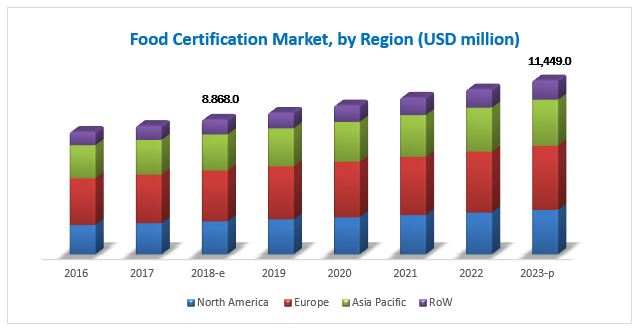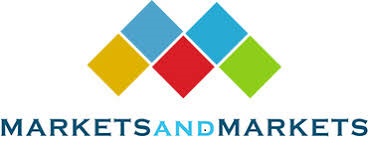The report “Food Certification Market by Type (ISO 22000, BRC, SQF, IFS, Halal, Kosher, Free-From Certification), Application (Meat, Poultry, and Seafood, Dairy, Infant Food, Beverages, Bakery & Confectionery), Risk Category, and Region – Global Forecast to 2023″ The food certification market is estimated to be valued at USD 8.87 Billion in 2018, and is projected to reach USD 11.45 Billion by 2023, at a CAGR of 5.2% from 2018. The market is driven by the factors such as increasing consumer awareness about certified food products, growing demand for processed meat products certification, and rising prevalence of foodborne illness. Furthermore, growing international trade, coupled with increasing food safety regulations, has been boosting the demand for food certifications.

Download PDF Brochure: https://www.marketsandmarkets.com/pdfdownloadNew.asp?id=82063283
Increasing demand for processed meat product certification
With the increasing demand for processed meat products, the cases of meat fraud are also increasing. The worldwide increase in malpractices, and a large number of fraud and adulteration incidents for meat & meat products have resulted in enhanced growth of the meat certification market. Religious concerns among consumers, especially Islamic and Jewish populations, drive the demand for halal and kosher certification for meat & meat products. Islamic and Jewish populations are exclusively dependent on halal and kosher meat for consumption owing to their religious beliefs.
The demand for meat certification in the global market is driven by the increasing stringency of regulatory bodies over safety and meat authenticity. The same, in turn, is driven by the increasing consumer demand for certified products which are perceived to be authentic and compliant with Islamic and Jewish laws for halal and kosher, respectively. Moreover, given the rise in food safety concerns worldwide, the non-Jewish population is increasingly shifting their preferences toward kosher products owing to the presumed hygiene and safety standards. The increasing shift of the Muslim population toward kosher products is observed owing to the limited availability of halal-certified meat and similarities between halal and kosher laws.
Lack of food control infrastructure & resources in developing countries
In developing countries, there is a need to update and revise the existing legal framework regarding food quality and safety. The infrastructure of food control bodies in many developing countries is likely to be scarce due to limited resources, limited technology, and poor management. Regulations governing food standards are often lacking necessary standards or are outdated. Food control infrastructure may be non-existent, poorly organized, or inadequately supported because of the lack of sufficient financial resources. In many countries, different government ministries or agencies are involved in food regulation and control, but their failure to coordinate their activities results in a waste of resources because of overlapping and redundant work efforts. There is generally a need for improved regulatory food inspection and laboratory services, development of food control enforcement programs, and the administration and coordination of food control activities in developing countries. Training in technical areas of food control is nearly always needed in such countries.
Request for Free Sample Pages of this report: https://www.marketsandmarkets.com/requestsampleNew.asp?id=82063283
North America is projected to be the fastest-growing region during the forecast period.
The North American region is projected to grow at the highest CAGR during the forecast period. The North American market is mainly driven by the strong food safety regulations imposed by the governments across the North American countries for imported goods.
The US accounted for the largest country-wise market for food certification in the North American region, and is majorly driven by the factors such as initiatives taken by the US government pertaining to certification and accreditation services and promotion of food certifications such as Safe Food Quality (SQF), GlobalGAP, and British Retail Consortium (BRC). Canada is the second-largest food certification market in this region. The stringency of food safety and import-export regulations imposed by the Canadian government are driving the market in the country.
This report includes a study of business strategies, along with the product portfolios, of leading companies such as DEKRA SE (Germany), DNV GL (Norway), Intertek Group Plc (UK), SGS SA (Switzerland), TÜV SÜD (Germany), Lloyd’s Register (UK), Eurofins Scientific (Luxembourg), Kiwa Sverige (Sweden), ALS Limited (Australia), and UL LLC (US).
Media Contact
Company Name: MarketsandMarkets
Contact Person: Mr. Shelly Singh
Email: Send Email
Phone: 1-888-600-6441
Address:630 Dundee Road Suite 430
City: Northbrook
State: IL
Country: United States
Website: https://www.marketsandmarkets.com/Market-Reports/food-certification-market-82063283.html

